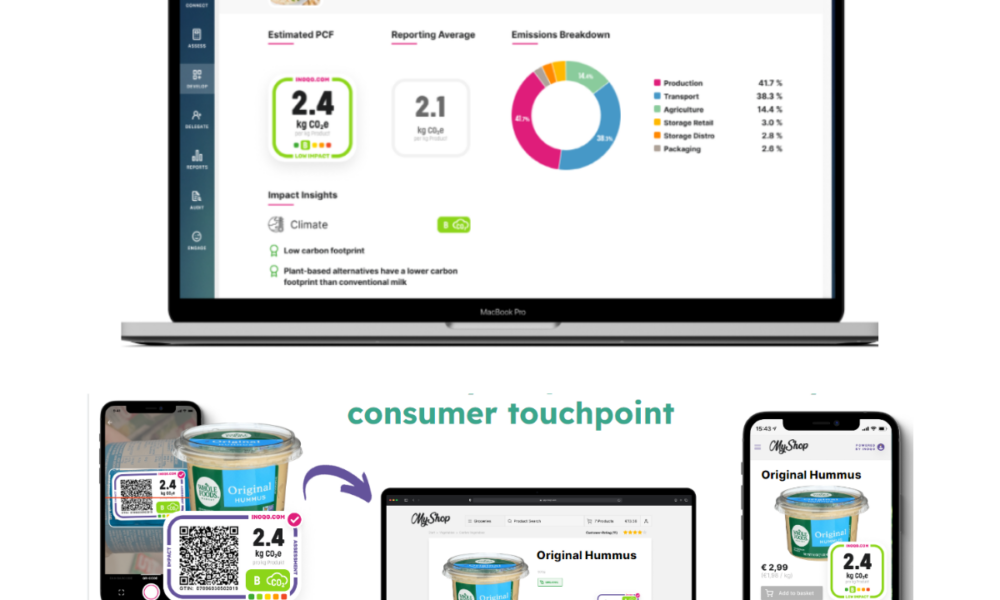Sustainable consumption
Adopting more healthy and sustainable food consumption lifestyle choices
CHOICE pilot activities in Austria
Motivation
Over the past 50 years, global food consumption patterns have shifted significantly, driven by rising incomes, population growth, and overall improvements in living standards. This shift has contributed to increased environmental pressures, particularly through the production and consumption of carbon-intensive food products.
A growing body of scientific research highlights the urgent need to transition toward more climate-resilient and sustainable diets. Even modest changes - such as reducing reliance on high-carbon-footprint foods - can support progress toward climate goals. Foods with lower CO₂ emissions, such as grains, fruits, legumes, and vegetables, generally offer a more sustainable alternative due to their significantly lower greenhouse gas (GHG) impact.
However, transitioning to low-impact diets is not without challenges. Factors like taste preferences, health perceptions, cost concerns, emotional connections, cultural traditions, and social status should be taken into account. Products with higher environmental footprints are often associated with affluence, making behavioral change complex.
To address this, strategies like positive and motivational communication, gamified tools, and clear, intuitive labelling have shown promise in helping consumers make more climate-conscious food choices. These tools support informed decision-making and encourage the adoption of lower-impact, sustainable eating habits.
Pilot Scope and Activities
Inoqo’s data and web components empower retailers such as dm-drogerie markt GmbH + Co. KG to show their consumers’ carbon footprints of individual grocery purchases (i.e. GHGs total equivalent-CO2e).
In CHOICE, inoqo’s data will enable the retailer to use a plethora of social engagement methods (e.g. nudging techniques, controlled trials and behavioural models) and large-scale “green marketing” campaigns, attempting to further visualise the impact of atomic choices by providing information on their multiplying effect, when adopted at mass scales, leveraging the results from CHOICE IAM models. This way, consumers will be presented with environmental and impact insights, which will be seen in dm’s online store and dmApp.
More than 1000 consumers and active users of dm online store and dmApp are expected to be involved, targeting more consumers who are not actively motivated to adopt healthy and sustainable food consumption as part of their lifestyle. Rewarding mechanisms, challenges and personalised messages based on the analysis related to targeted personas and socio-economic
profiles will offer impactful, simplified, yet scientifically sound information on the user’s individual consumption habits and their outcome on a global level. Further, hand-picked data storytelling visuals and text shall be adopted in certain challenges.
Enablers
The following CHOICE enablers will be used to achieve the pilot scope:
- Ιnoqo’s product impact assessment platform.
- dm Germany’s online store and the dmApp
- Data storytelling visuals and narratives.
- Randomized controlled Trials (A/B tests) framework.
- CHOICE IAM models (FELIX, Globiom) through their interactive interfaces.
- Behavioural models.
Expected Measurable Outcomes
- 1000+ active users, 5 campaigns informed by CHOICE research across 2 channels.
- Reduction Potential.
Partners Involved
Pilot leader:
![]()

Partners:
![]()
![]()
![]()
![]()
Campaigns in Austria
From Local Action to Global Impact
Find more about the specifics of each pilot campaign that have been performed in the Austria.
Rethinking Dairy Choices – For You and the Planet
Overview:
The German pilot campaign, led by inoqo in collaboration with dm-Germany, is designed to provide transparency of the environmental impact of milk consumption and plant drinks as an alternative. By comparing plant-based drinks to cow’s milk, the campaign guides consumers through a data-informed journey - seamlessly integrated into dm’s online store. A prominent homepage banner introduces the topic, directing users to a dedicated product comparison page. There, shoppers can explore both dairy and plant-based options side by side. On product detail pages, inoqo’s carbon footprint assessments offer clear, accessible information to enable consumers make their own climate-conscious decisions at the point of purchase.
Objectives:
- Raise consumer awareness about the environmental impact of cow’s milk and plant-based alternatives.
- Highlight the unique value of each product. (e.g., familiar taste and lower emissions)
- Promote sustainability as consideration in everyday grocery choices.
Target Audience:
dm online shoppers across Germany, particularly those making regular grocery purchases and open to sustainability-driven decisions.
Approach & Activities:
The campaign uses clear, positive messaging to emphasize the respective benefits of the milk and plant based drinks:
- A banner on dm.de and on the dmApp introduces the campaign and encourages consumer engagement.
- Clicking the banner leads to a curated overview page that presents both milk and plant-based drinks equally, enabling informed comparisons.
- Product detail pages include the carbon footprint of each featured item, making environmental impact a transparent part of the decision-making process
This approach makes sustainability data both visible and actionable—integrated naturally into the shopping journey without disrupting it.
Timeline:
20th of August – 3rd of September
Location:
Online via dm.de and dmApp, reaching consumers across Germany.
Expected Impact:
- Increased consumer awareness of the climate footprint of milk products.
- Inform on the adoption of plant‑based milk alternatives with lower environmental footprint.
- Measurable reduction in the carbon footprint of grocery purchases through more informed choices.
Learn more: pilot factsheet
Join the Campaign!
Your breakfast, Your CO2 value
Overview:
The 2nd German pilot campaign, led by inoqo in collaboration with dm-drogerie markt, aims to increase customer engagement with CO₂ footprint information for everyday breakfast products, specifically selected mueslis, through an A/B-tested email newsletter. The campaign invited dm customers to discover the CO₂-eq value of featured products and explore sustainability information in a simple, relatable way. By testing two subject-line variants (informational vs. emotional framing), the pilot also generated insights into which messaging approach drives higher attention and engagement at scale.
Objectives:
- Increase awareness and transparency of CO₂ footprint information for everyday breakfast products.
- Increase product information engagement.
- Test whether emotional vs. informational newsletter subject lines improve engagement.
Target Audience:
dm customers across Germany who make routine grocery purchases and are open to sustainability-driven decisions.
Approach & Activities:
The campaign uses clear, relatable messaging to introduce CO₂ footprint information in an accessible way and encourage customers to engage with sustainability data, focused on everyday breakfast items:
- An email newsletter introduces the topic and invites recipients to discover the CO₂-eq value of selected breakfast staples (e.g., muesli).
- The newsletter highlights the CO₂ footprint (kg CO₂e/kg product) for featured breakfast products, making the impact easy to understand at a glance.
- Two messaging approaches were tested in parallel (A/B test), one more informational and one more emotional, to learn which framing is more effective at driving attention and clicks to explore the CO₂ information.
- Campaign performance was tracked via newsletter analytics (opens, clicks, unsubscribes), focusing on engagement and exploration rather than purchase outcomes.
Timeline:
3rd of December – 15th of December 2025
Location:
Online via dm’s email newsletter channels, reaching consumers across Germany.
Expected Impact:
- Improved visibility of CO₂ footprint information for everyday grocery choices by introducing it through a familiar touchpoint (the newsletter), starting with habitual breakfast staples like muesli.
- Clear guidance for future communication: the pilot shows that more emotional, relatable framing is more effective than purely informational framing for capturing attention, and can be confidently used as the default approach.
Learn more: pilot factsheet






